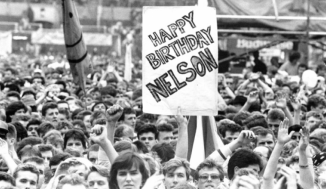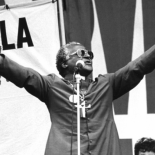In 1964 Nelson Mandela and seven other leaders of the African National Congress and Umkhonto we Sizwe were sentenced to life imprisonment. International pressure helped save them from the death penalty.
SUNDAY POST CAMPAIGN
In 1980 a new campaign for Mandela’s release was initiated inside South Africa by the Sunday Post newspaper. In the 1980s Mandela received an avalanche of honours from all over the world, especially in Britain. In 1981 Glasgow City Council was the first of nine British local authorities to make Mandela a freeman of their city. Streets, gardens and buildings were named in Mandela’s honour. Over 20,000 mayors from cities on every continent signed a declaration calling for his release.
‘NELSON MANDELA: FREEDOM AT 70’
The AAM launched the ‘Nelson Mandela: Freedom at 70’ campaign at a concert in Wembley Stadium in 1988. Rock stars played to a capacity audience and the concert was broadcast by the BBC to over 60 countries. Next day 25 freedom marchers set off from Glasgow for London, where they arrived on the eve of Mandela’s birthday. A quarter of a million people gathered in Hyde Park to hear Bishop Desmond Tutu call for Mandela’s release. On 18 July a special service was held in St James’s Piccadilly and thousands of cards were delivered to South Africa House.
MANDELA RELEASED
Mandela was released two years later, on 11 February 1990. In April he came to London, where he was welcomed at a second Wembley concert. He thanked the people of Britain and said the support he had received from the Anti-Apartheid Movement was ‘a source of real inspiration’.
Mandela had become an icon of the freedom struggle. His release unleashed a wave of support for the ANC and heralded the beginning of the negotiations which led to a free and democratic South Africa.


